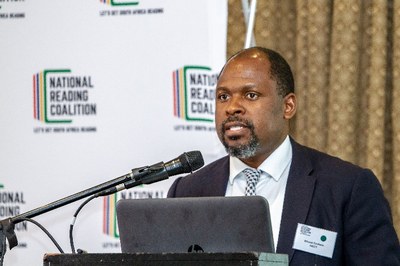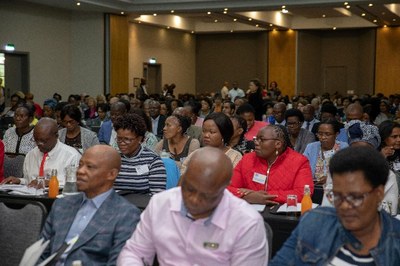 On Friday, 15 February at the Kopanong Hotel and Conference Centre, the NECT together with the Department of Basic Education (DBE) called on all South Africans to coordinate efforts towards addressing the reading challenge facing the country.
On Friday, 15 February at the Kopanong Hotel and Conference Centre, the NECT together with the Department of Basic Education (DBE) called on all South Africans to coordinate efforts towards addressing the reading challenge facing the country.
The NRC is a self-sustaining, agile ecosystem of reading initiatives across South Africa. It is pitched as a collaborative platform where ideas can be developed and implemented by various role players to improve the state of reading in and outside the classroom. At the outset, coalition will target schools in 25% of the Education Department circuits across the country. This involves 263 circuits out of a total of 1051.
 The launch was attended by over 400 representatives from the civil society, business, unions and education fraternity at large.
The launch was attended by over 400 representatives from the civil society, business, unions and education fraternity at large.
Mr Khosa shared interim findings from a reading landscape audit conducted in the target 25% of education circuits and provided details of reading initiatives currently being implemented within the coalition.
Furthermore, the NRC will be working to leverage off strides and efforts made by the Department of Education’s Read to Lead Campaign which was launched in 2016. Minister Angie Motshekga fully welcomed the development of the coalition and indicated that it will help speed up the momentum of the Read to Lead Campaign.
The launch also gave an opportunity for stakeholders to make inputs on a proposed national plan in a form of breakaway commission sessions. The inputs were guided by a value chain model with six focus areas namely: Initial Teacher Preparation, Access to Resources, Community Involvement, Continuous Professional Development, Policy, Research and Evaluation.
After the breakaway sessions, convenors assigned to each focus area presented inputs on how to tackle the reading challenge over the next three years.
Commission Session Highlights
|
Focus Area
|
Highlights
|
|
Initial Teacher Preparation
|
Initial Teacher preparation should focus on increasing the number of skilled African language teachers
Strengthened initial teacher education programmes that enable new teacher graduates to teach reading competently as beginning teachers
|
|
Continuous Professional Development
|
Expanding the capacity of literacy NGOS and other providers to complement and strengthen teacher development
|
|
Access to Resources
|
Introduction of Library in a Box concept for schools, libraries & public spaces to increase access to books
The provision of age appropriate access to content;
- In indigenous languages
- With appropriate fiction and non-fiction content
- That appeals to children and encourages them to read.
|
|
Policy & Research
|
The development of a policy framework that supports reading processes and practices that address the needs of bi/multilingual and multicultural learners and teachers who can function as reflective and critical beings in the 21st century
|
|
Community Involvement
|
Tap into community capital (Traditional leaders, youth leaders, faith community leaders, commercial actors) to play a role in;
- igniting reading for enjoyment
- making reading visible, social and aspirational
|
Going forward, the convenors in consultation with the relevant role players are set to devise an action plan that will guide the better coordination and facilitation of reading initiatives based on the commission findings and inputs.
Ultimately, a consensus was reached that for the coalition to maximise its potential, it must align the many literacy initiatives in SA, reduce duplication and gaps, maximize reach, impact and ensure opportunity for scale.





 On Friday, 15 February at the Kopanong Hotel and Conference Centre, the NECT together with the Department of Basic Education (DBE) called on all South Africans to coordinate efforts towards addressing the reading challenge facing the country.
On Friday, 15 February at the Kopanong Hotel and Conference Centre, the NECT together with the Department of Basic Education (DBE) called on all South Africans to coordinate efforts towards addressing the reading challenge facing the country.  The launch was attended by over 400 representatives from the civil society, business, unions and education fraternity at large.
The launch was attended by over 400 representatives from the civil society, business, unions and education fraternity at large. 